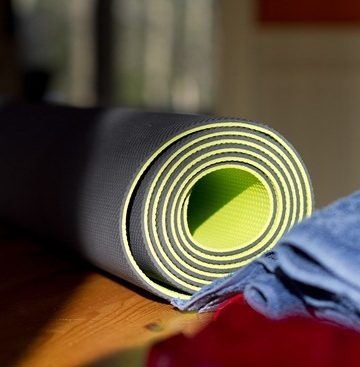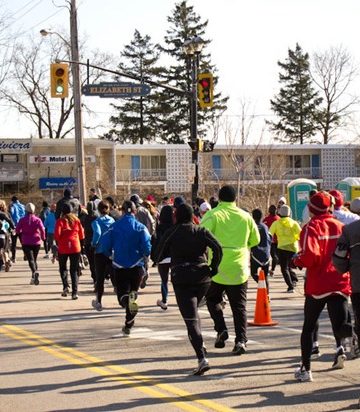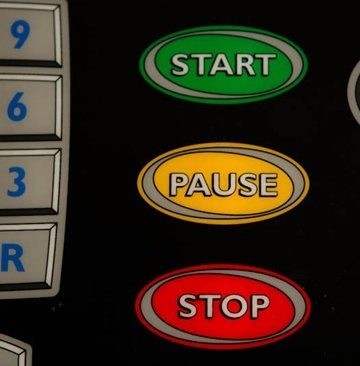Today I will be talking about another ‘New Rule’ from the ‘The Rules: Revisited’ Runner’s World article that I featured the other day.

Today’s topic: Carbs and training
Old rule:
Emphasize carbs when you’re marathon training, especially before and during long runs.
New Rule:
Do some long runs in a carb-depleted state
In this part of the article, Bob Cooper talks about how carbs have been the focus of nutrition advice for runners for the past several decades. Since carbs are the most readily available fuel source for our bodies, it makes sense to consume lots of them prior to a race or long duration activity. However, exercise physiologist, Greg McMillian, says that runners should do some long runs in a carb-depleted state. In other words, don’t load up on carbs prior to some of your long training runs.
That doesn’t exactly sound like a fun run in the park now does it? Greg is trying to take away one of the things I love about running; being able to stuff my face around the clock! ;)
Greg explains his theory:
“You need to teach your body to operate with low glucose stores because that’s what you’ll be facing in the later miles of a marathon.”
He suggests that runners skip their carbs before and during long runs to improve the body’s ability to burn fat and store glycogen, which is pivotal in long bouts of intense exercise.
“By not taking in carbs or energy gels during the run, you’re giving your body no choice but to go to fat-burning. You will feel fatigued near the end, but that’s necessary if you want to get stronger.”
Greg suggests not to go cold turkey on carbs with your next 20-mile run. He says to wean yourself off of carbs by consuming them less and less before and during long runs to train your body to manage without them.
~~~~~~~~
Yowza.
When I first started running on a regular basis last Spring/Summer 2008, I always ran on an empty stomach. Otherwise, I would find myself getting really bad stomach cramps. The downside of this? I couldn’t run very far without feeling really drained and fatigued. Since doing more research on running, I have since switched over to the ‘carb loading’ camp, by making sure that I do fuel up, at least modestly, before my runs. And for whatever reason I find that I don’t suffer from running cramps anymore. Perhaps, my body has just adapted better to running now. I find that I am able to go longer distances when I fuel up beforehand and not ‘hit the wall’.
The thought of doing my long runs without carbs seems quite daunting to me. And I still question Greg’s approach. While I can see that it may train the body to use other fuel sources, I find myself asking what the point of that is.
Runners have access to plenty of carbs during races, such as Gatorade, energy gels, and chews, so is it really necessary to endure these long intense runs with no carbohydrate fuel? I mean, this may be obvious, but isn’t that what it’s there for?
During my 10 miler, I took Gatorade by mistake at the 2nd or 3rd water station and I was worried how my body would react. Well, I was thrilled to find that the Gatorade gave me a huge energy boost, much more than regular H20 did. And so at each water station thereafter I drank my carbs. I know my performance was enhanced because I felt a little kick to my step after drinking about 4oz every station.
The article doesn’t state any hard evidence of Greg’s theory, nor does it suggest what we should be eating instead of carbs. I would love to see some research on this topic. I know that protein can be very hard on the stomach prior to runs (it is hard to digest) so I always personally avoid protein and also fibre before a run. So what’s left if I also don’t consume carbs? Personally, I would love to pick Greg’s brain a little more on this subject as I find the article didn’t quite convince me enough to forgo my fuel. I would also love to hear from more experienced runner’s- have you ever given this a try and did it improve your running?
What do you think of Greg’s theory? Would you try it out?






The only way I have semi-trained with this theory is in terms of GU and Gatorade. When I trained for my marathon I would only drink h20 on my long runs, and take 1/2 GU packets. Because I knew my stomach could handle more amounts (due to previous experiences…) I would then switch to Gatorade and full GU packets on race day. Knowing my body could handle the intensity on less fuel made my extra power bursts propel me to the next level. I never went without carbs, however, and especially not in my pre or post run fueling…to me that’s just a recipe for disaster. Limiting my carbs while actually running … however… did give me both a physical and mental boost!
-Kerri from Enzymatic Therapy
I tried to do both- with and without carb loading- without carbs before a workout, I hit the wall after 3 miles. With carbs, I could run for up to 13 miles. I think for me- it’s very psychological..when I have carbs, my mind is saying ‘look, you’ve no excuse to be feeling tired, you’ve got the energy’ whereas when I don’t eat anything, my mind is saying ‘Awww poor you- you must be really hungry!!!!!’ :)
This has worked well for me. I am up to 2 hours (about 12 miles) on my long steady steady state runs now with no problems. I had to start slowly cutting carbs to work my way up to this point. Just like building any adaptation in the body, you have to be patient and do just a little at a time. If you just go out and run in this state you will not get very far. The body has to have time to adapt.
http://team.firstendurance.com/page/low-carbo-training-1
Back in the 70s and 80s, many runners did a moderately long run about a week before their marathon, followed by 3 days of low carb , then 3 days of high carb. The muscles become more sensitive to storing glycogen during the depletion phase and become”supercompensated” during the carb loading phase. I see no point to depleting before a long run – the long run itself is depleting. I can tell you that this worked very well. The idea that you would want to burn slow and inefficient fats results in slow running.
This article
http://www.runnersworld.com/nutrition-runners/running-empty?page=single
references one study at an overseas institute. I have not really searched hard for anymore research. I think one key is…this is only done during a couple of long runs, 10 to 8 weeks out from your marathon. In between those runs you are eating carbs out your ying yang to refuel. AND it is for SLOW runs only, not fast finishes or races. McMillan’s article is quoted above, but if you read the entire article, he says it is not for everyone and to make sure and carb up after and to NOT do this for long fast finishes and not to run more than 3 hours.
For me, I am willing to try new methods at least once to see if they benefit me any….if not I toss it and chalk it up to experience. I think that is pretty much what has made me improve in my marathons is just experimenting. And everyone is not going to be the same. I think if you run to enjoy eating, then enjoy eating!!! I run because I enjoy competing with myself to see how much farther I can take my performance.
Have tried this yesterday. I think that the key to tap on the fat as fuel is to do longer warm-ups. I covered the same distance but with somewhat increased time, about 3minutes.. Perceived exertion was pretty low, perhaps about 11 or 12, did not feel any soreness and felt good. I only ran faster towards the last 10minutes. RPE was usually 13 to 14 when I cover the same distance and load up with carbs prior to running. When you want to run fast, i believe that’s when the sugar will be useful. To each his own. What works for one may not work for the other. Maybe when we’re doing easy runs, this works good. I’ll try it on my tempo run and see how it works.